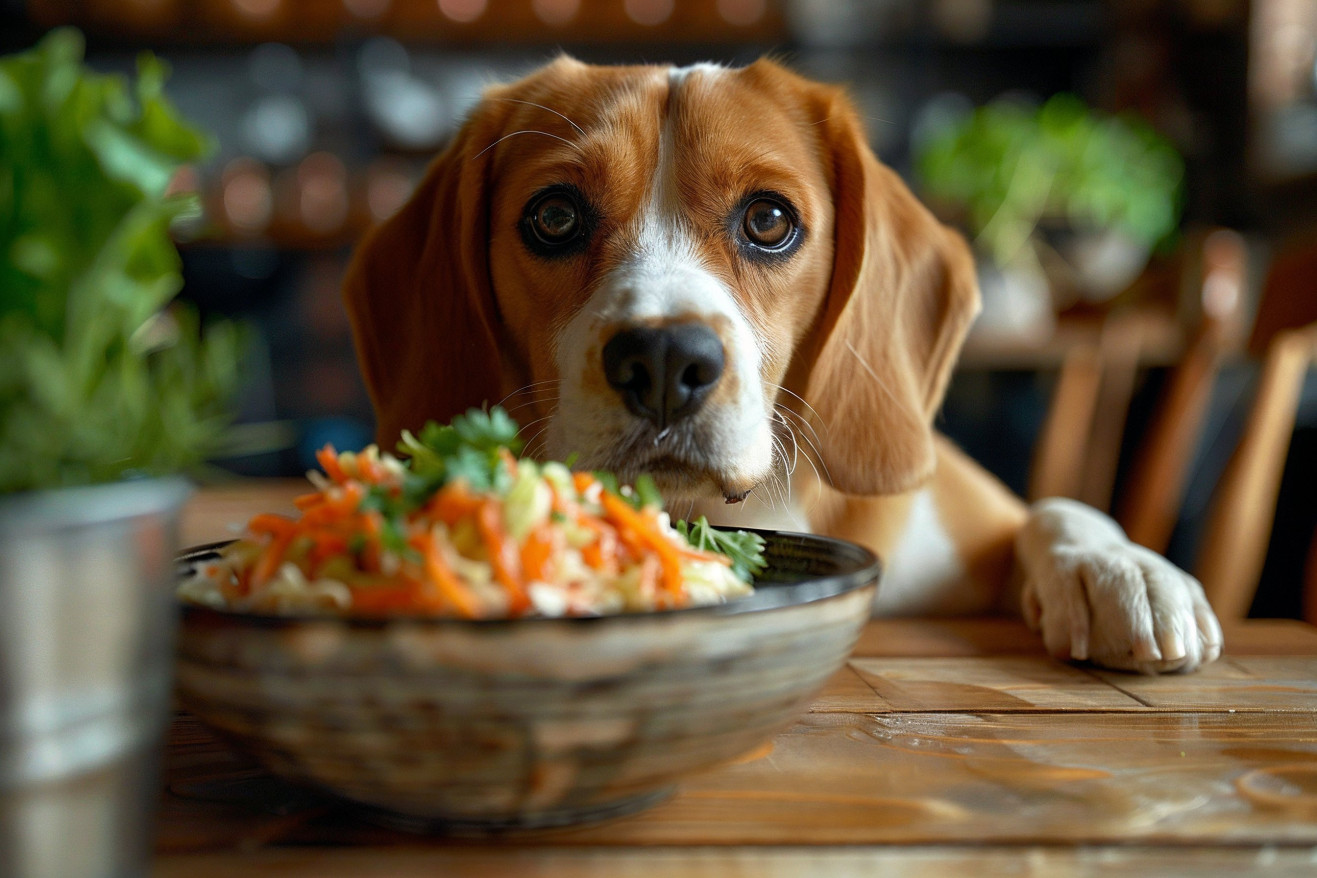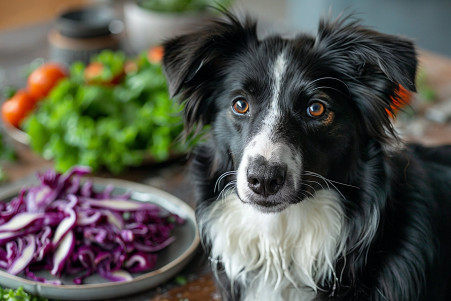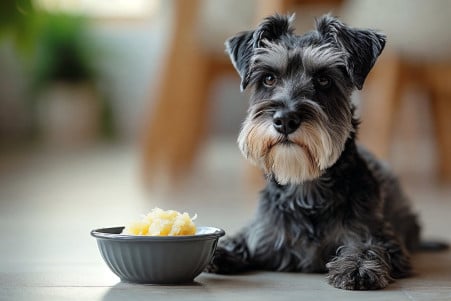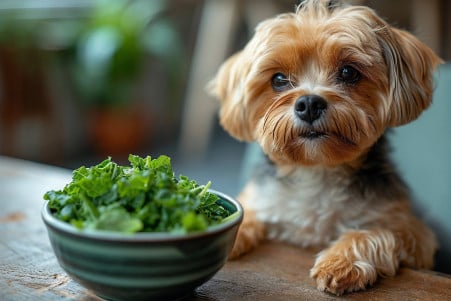Can Dogs Eat Coleslaw? A Look at the Risks and Benefits
2 April 2024 • Updated 2 April 2024

If you’ve ever been eating a delicious meal that includes coleslaw and your dog gives you those big, sad eyes, you may have found yourself wondering if you can share your coleslaw with your furry friend. After all, coleslaw is made from cabbage and carrots, both of which are healthy for dogs, right?
While it’s true that cabbage and carrots can be good for dogs, especially as part of a balanced diet, the other ingredients in coleslaw, particularly the high fat and dairy content in the dressing, make it a less than ideal choice for dogs.
That said, while coleslaw may not be the best choice for your dog, we’ll take a deep dive into the latest research and expert advice on dog nutrition and digestion to help you better understand which specific ingredients in coleslaw are safe and unsafe and how you can use that information to decide which human foods to share with your dog. By learning about the risks and benefits, you’ll be able to decide whether or not to let your dog have a taste of this classic picnic side dish.
Can dogs eat coleslaw?
Nutritional Value of Cabbage and Carrots for Dogs
Cabbage and carrots, two of the main ingredients in coleslaw, are both nutritious foods that can be healthy snacks for dogs in the right quantities. The American Kennel Club notes that cabbage is low in calories and high in fiber, and it's also a good source of vitamins C and K, magnesium, and beta-carotene. These nutrients can help with inflammation, cell health, and digestion and immunity, and they can also help support eye and skin health in dogs.
Carrots are also an excellent source of vitamins, minerals, antioxidants, and fiber. They are low in calories and high in fiber, making them a good choice for dogs that are overweight or have diabetes. The fiber in both cabbage and carrots can help with digestion and make dogs feel full, which can be helpful for dogs that need to lose weight.
That said, veterinarian Albert Ahn warns in Daily Paws that cabbage can lead to gas because it contains fiber and raffinose. This means that some dogs may have trouble eating a lot of cabbage without experiencing gas and other digestive issues. As a result, while cabbage and carrots have several health benefits, it's important to introduce them slowly and in small amounts to minimize the risk of side effects like gas, bloating, or an upset stomach.
Potential Dangers of Mayonnaise and Other Coleslaw Dressings for Dogs
While the vegetables in coleslaw, such as cabbage and carrots, can have some health benefits for dogs, the high-fat content and other potential dangers of the most common coleslaw dressings make coleslaw a potentially dangerous choice for dogs. According to The Spruce Pets, mayonnaise, which is often used to make coleslaw dressing, doesn't have any toxic properties for dogs. However, the high fat content in mayonnaise can cause gastrointestinal upset, obesity, and even pancreatitis if it's consumed in large amounts.
MasterClass explains that while a small amount of mayo is unlikely to hurt a dog, it's best to avoid giving this fatty food to dogs, even as an occasional treat. DogTime also points out that while mayonnaise isn't toxic to dogs, its high fat content can lead to obesity and other health issues in dogs if it's given to them regularly.
In addition to mayonnaise, the other ingredients in coleslaw dressing may include onions, garlic, or other spices that could be dangerous or toxic to dogs, as Dogster points out. While a dog is unlikely to get seriously ill if they eat a small amount of dressing by accident, dog owners should avoid giving their dogs coleslaw dressings.
How to Make Dog-Friendly Coleslaw
If you want to give your dog coleslaw, the best way to do so is to make a homemade version that doesn’t contain any toxic or high-fat ingredients. Kate's K9 Pet Care recommends that you start by giving your dog some of the shredded cabbage and carrots before you add the dressing and other ingredients. This way, your dog can eat the healthy vegetable ingredients without the risk of the high-fat mayonnaise or other potentially harmful ingredients.
If you want to make a coleslaw that’s safe for dogs, Kate's K9 Pet Care recommends starting with plain, shredded cabbage and carrots and adding other safe vegetables like green beans or celery. Instead of mayonnaise, you can use a healthier dressing like plain yogurt or a vinegar-based dressing that contains a minimal amount of oil. Just make sure you don’t add any onions, garlic, or other spices that could be toxic to dogs.
The American Kennel Club points out that while cabbage and carrots are safe and healthy for dogs, they can cause gastrointestinal upset, including gas and bloating, if they’re introduced too quickly or in large amounts. As a result, you should introduce your dog to your homemade coleslaw slowly and in small amounts, and watch for any negative reactions.
More Healthy Vegetable Options for Dogs
If coleslaw isn't the best option, there are plenty of other vegetables that are safe and healthy for dogs to eat. The American Kennel Club lists dog-friendly vegetables as including broccoli, Brussels sprouts, green beans, leafy greens, peas, pumpkin, spinach, and sweet potatoes. These vegetables can offer a range of vitamins, minerals, fiber, and other nutrients that can help dogs stay healthy.
That said, Dr. Buzby's ToeGrips for Dogs points out that new vegetables should be introduced slowly and in small amounts to avoid digestive issues like gas or bloating that can come from a sudden increase in fiber. Forbes Advisor also recommends that vegetables should be washed, cut into small pieces, and make up no more than 10% of a dog's daily caloric intake to ensure they don't cause any issues.
Conclusion: Coleslaw for Dogs Should Be Given in Moderation and With Caution
While coleslaw may not be the best option for dogs due to the potential dangers of the dressings and other ingredients, the vegetables can be helpful if given in moderation. Dog owners should always be careful when giving their dogs human food and should avoid any ingredients that are known to be harmful or toxic.
If you want to give your dog ingredients that are similar to coleslaw, it's best to make it at home with ingredients that you know are safe and healthy. However, it's most important to make sure that your dog is getting a well-balanced diet that meets their individual needs. A vet can help you with this and can give you personalized advice on how to give your dog healthy human food.


